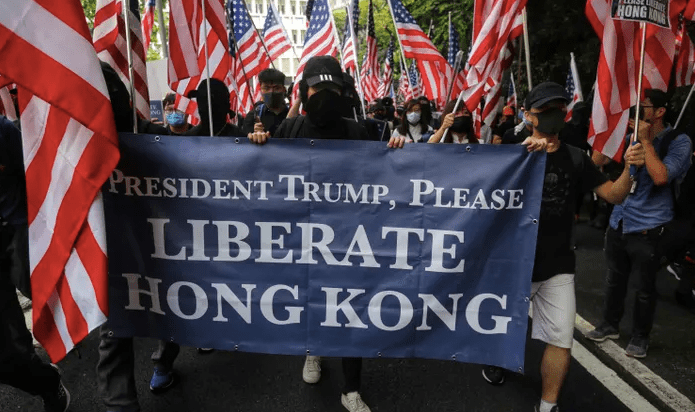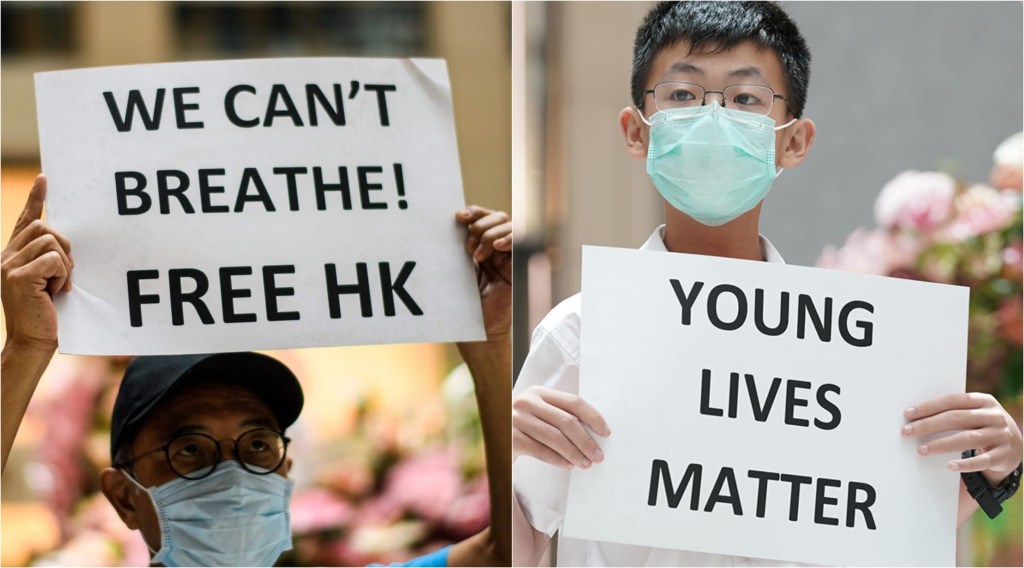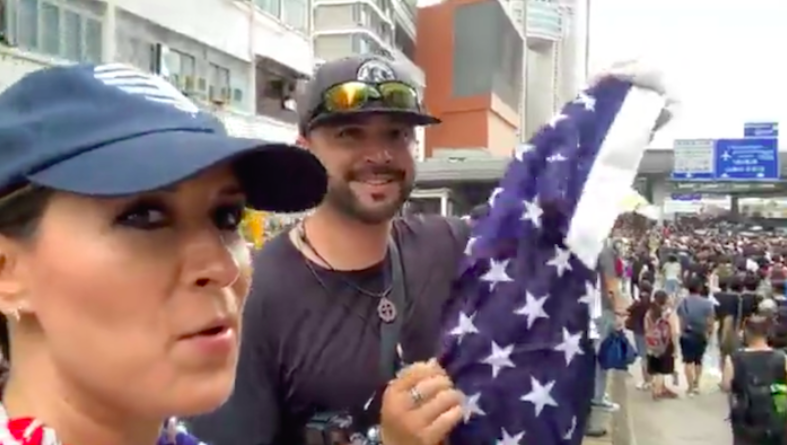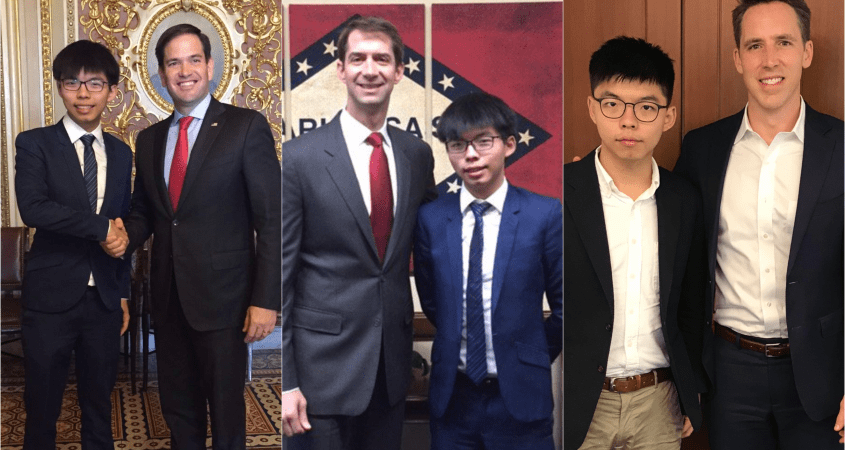Ajit Singh reports on Hong Kong organizers’ ties to far-right politicians in Washington.
 A leading Hong Kong “pro-democracy” figure, Jimmy Lai, has denounced nationwide protests in the United States against police brutality and systemic racism, which were sparked by the police killing of an African-American man, George Floyd. Lai’s views reflect a significant segment of the city’s protest movement, who affirm the exceptionalist myth of the U.S. as a beacon of “freedom and democracy.”
A leading Hong Kong “pro-democracy” figure, Jimmy Lai, has denounced nationwide protests in the United States against police brutality and systemic racism, which were sparked by the police killing of an African-American man, George Floyd. Lai’s views reflect a significant segment of the city’s protest movement, who affirm the exceptionalist myth of the U.S. as a beacon of “freedom and democracy.”
Hong Kong’s “pro-democracy” activists have gone so far as to derail the efforts of an African-American woman who attempted to organize a Black Lives Matter demonstration in the city, accusing her of being an agent of the police and Communist Party of China.
Meanwhile, some leaders of Hong Kong’s anti-Beijing opposition, such as Joshua Wong, have claimed to support the U.S. protests and Black Lives Matter. However, these expressions of “solidarity” ring hollow, given that, like Lai, these “pro-democracy” leaders have also forged an alliance with the very U.S. state and far-right politicians who have demonized and sought to brutally repress American protesters. In fact, Wong and his comrades have carefully avoided making any specific criticism of President Donald Trump or any of their other sponsors in Washington.
Lai’s comments and the duplicity of Hong Kong’s “pro-democracy” opposition, once again highlight the inconvenient truths of this movement that many in the West have insisted is progressive. Although some have tried to equate Hong Kong’s “pro-democracy” movement with Black Lives Matter, they are, in fact, on opposite ends of the political spectrum.
‘Rupert Murdoch of Asia’
As Dan Cohen reported for The Grayzone, Lai is a billionaire media tycoon widely referred to as the Rupert Murdoch of Asia who is a major financial and media backer of Hong Kong’s protest movement. In addition to pouring millions of dollars into Hong Kong’s opposition in recent years, the self-described “head of opposition media” and founder of the anti-government Apple Daily tabloid, has provided protesters with “unswervingly favorable coverage” according to The New York Times. Lai has received glowing coverage in U.S. and Western media, with the oligarch often being praised as a “‘troublemaker’ with a clean conscience” who is “standing up to China.”
On June 2, Lai shared a video by Avi Yemini, a far-right YouTube personality and former Israeli army soldier, declaring that it was “bloody disgraceful” to liken the “riots in America” with Hong Kong’s protest movement.
Please Contribute to Consortium News’ 25th Anniversary Spring Fund Drive
In the video, Yemini rattled off right-wing talking points, referring to the anti-racist protesters as “antifa extremists” who are “destroying everything that is American, in fact, everything that Hong Kongers are fighting to obtain.” Lai expressed his gratitude to Yemini, writing “thank you for speaking up for us #HKers.”
According to the Australian Jewish Democratic Society, Yemini has formed extensive ties to neo-Nazis such as the Soldiers of Odin and fascist agitators like Milo Yiannopoulis.
"The riots in America are nothing like Hong Kong, and comparing the two is bloody disgraceful.”@OzraeliAvi thank you for speaking up for us #HKershttps://t.co/EzDQzzGefH
— Jimmy Lai (@JimmyLaiApple) June 2, 2020
A few days earlier, Lai, who has met repeatedly with Trump administration brass, told CNN that “only Trump can save Hong Kong.” Lai reiterated his call for President Trump’s support mere hours after the president threatened to have the U.S. military shoot George Floyd protesters.
The sentiment was unsurprising considering that much of the protest movement in Hong Kong has lionized the U.S., upholding the U.S. government and Trump as their “liberators.” For years, leaders of Hong Kong’s opposition have met and strategized with U.S. government officials and politicians, most frequently those on the far-right.
 Indeed, Lai’s views on the George Floyd protests appear to reflect those of a significant segment of Hong Kong’s “pro-democracy” movement, to the dismay of those who argue that the movement is “progressive.”
Indeed, Lai’s views on the George Floyd protests appear to reflect those of a significant segment of Hong Kong’s “pro-democracy” movement, to the dismay of those who argue that the movement is “progressive.”
The Lausan Collective, a self-described “decolonial left” English-language publication founded by staunch supporters of the Hong Kong protests, lamented that “some Hongkongers have refused to stand with Black Lives Matter” urging their comrades to support protests taking place in the U.S. .
Wilfred Chan, a New York-based contributing writer for The Nation and founding member of Lausan, expressed frustration at the prevalence of such views. In a June 2 tweet, Chan wrote that “every other hongkonger [sic]” on LIHKG (a popular online platform among Hong Kong’s protest movement that has been called “Hong Kong’s Reddit”), “is suddenly an expert on the american [sic] criminal justice system and also believe the only reason anyone could be critical of trump [sic] is because they’re an agent of the [Communist Party of China]”.
every other hongkonger on lihkg is suddenly an expert on the american criminal justice system and also believe the only reason anyone could be critical of trump is because they’re an agent of the ccp
— wilfred chan (@wilfredchan) June 2, 2020
Examples of this have surfaced on Twitter, with vocal supporters of the Hong Kong protests claimingthat the Communist Party of China is behind Black Lives Matter, comparing Black protesters to gorillas, and claiming that the “real America” consists of Black people who are looters and white people who clean up after them.
Racist and nativist undercurrents have been present throughout the Hong Kong protests. Although this has primarily been directed towards mainland Chinese, anti-black racism has also previously erupted during the protests. Following NBA superstar LeBron James’s refusal to declare support for the movement, intense backlash swept across the city with protesters trampling on and burning the basketball icon’s jerseys. In one gathering, hundreds of angry protesters appear to have chanted racial slurs directed at James, with the Associated Press reporting that the chant “wasn’t printable.”
Derailing ‘Black Lives Matter’ Rally in Hong Kong
Hong Kong “pro-democracy” activists have gone so far as to derail the efforts to organize a Black Lives Matter rally in the city following the killing of George Floyd. In a letter shared with the Hong Kong Free Press, event organizer Jayne Jeje, an African-American woman who has lived in Hong Kong for eight years, outlined the harassment she received that led to her cancelling the event.
According to Jeje, “pro-democracy” activists accused her of “working with the police to entrap people” and “being backed by the CCP [Communist Party of China].” On the social media event page for the rally, Jeje wrote that she was bombarded with “attacks” and hostile comments consisting of “mistruths, bullying, accusations, and profanity.”

An excerpt of Jayne Jeje’s letter shared with the Hong Kong Free Press.
Jeje wrote that she was accused of having “expat privilege,” grilled about “why the event was only about BLM, since HK lives matter too.” More concerned with co-opting the event to advance their own agenda than demonstrating solidarity, Hong Kong “pro-democracy” activists told Jeje that she “[did not] have the right to comment on BLM” unless she made the Hong Kong protests a focus of the event. In this vein, Hong Kong protesters have recently appropriated the slogans “I can’t breathe” and “Black Lives Matter” for their own demonstrations.

Demonstrators in Hong Kong hold signs on June 9, 2020, marking the one-year anniversary since “pro-democracy” protests began in opposition to a now-withdraw extradition bill.
Ultimately, due to this harassment and fear that “pro-democracy” activists would sabotage the event, Jeje and the other event organizers chose to cancel the Black Lives Matter rally. “[We] made the painful decision to cancel the event, based on angry messages that we were cooperating with the police, or not including their issues or responding to their demands” wrote Jeje. “We feared they would come and purposefully ruin the event.
Aligned with Politicians Repressing Black Lives Matter
There are some within Hong Kong’s “pro-democracy” movement who have issued statements expressing support for the protests taking place in the U.S. and the Black Lives Matter movement, arguing that both movements are engaged in a shared struggle against oppression and police brutality.
Joshua Wong, poster-boy for the Hong Kong protests, Nathan Law, along with other leading members of his political party, Demosist?, have stated that they stand with Black Lives Matter. “Many of you have asked me about the ongoing U.S. protests” wrote Wong in a June 2 tweet. “As a human-rights activist, I stand firmly on the side of the #BlackLivesMatter movement and oppose police brutality, wherever it may be.”
Although he had never mentioned Black Lives Matter prior to this tweet, Wong has now claimed that both he and Hong Kong’s protesters have long stood in solidarity with the movement. “Time and again, we see how people fighting oppression in Hong Kong continue to stand with people fighting oppression in the United States. #BlackLivesMatter,” Wong wrote in a June 4 tweet, sharing an image of a Hong Kong protester holding a sign which read “I CAN’T BREATHE.”
In calling for solidarity between the two movements, Lausan argued that they “both stem from the same system of state violence and oppression” and are connected by “similarly being victims of police brutality.”
However, what Joshua Wong and other Hong Kong “pro-democracy” leaders, along with “left-wing” supporters like Lausan, omit from their pronouncements of “solidarity” with Black Lives Matter, is that their movement’s principal ally is the very U.S. state which is brutally repressing American protesters fighting for racial justice.
Leaders of Hong Kong’s opposition like Wong have spent years cultivating close relationships some of the most hawkish figures in Washington. Their most vociferous allies include far-right Republican Senators Ted Cruz Josh Hawley, Marco Rubio, and Rick Scott, and Tom Cotton, who recently called for a U.S. military crackdown on Black Lives Matter protests. Their expressly stated goal, as spelled out by a U.S. -based lobbying firm, is to advance their movement against the Chinese government and “preserve the U.S. ’s own political and economic interests in Hong Kong.”
Given their open alliance with the very politicians who have demonized U.S. protesters as “looters”and “antifa terrorists”, doxxed protesters, claimed that the Venezuelan government is behind the demonstrations, and made fascistic calls for the military to impose martial law, the expressions of support for Black Lives Matter by leaders of Hong Kong’s “pro-democracy” movement ring hollow. It is no coincidence that the statements by Wong and his comrades do not mention, let alone criticize, their far-right sponsors in Washington. In fact, just days prior to his pronouncement of solidarity with Black Lives Matter, Wong sent birthday wishes to Senator Rubio.
These alliances highlight the superficiality of the “solidarity” of Hong Kong’s opposition with Black Lives Matter and reflect the fundamental political differences between the two movements.
In stark contrast to the Black Lives Matter movement, which has called into question the racial oppression that undergirds the American political system, the Hong Kong protesters have proudly affirmed an exceptionalist, whitewashed notion of the U.S. as a beacon of “freedom and democracy,” adorning themselves in the stars and stripes and belting out the Star-Spangled Banner while beseeching the U.S. to police the Asian Pacific region.
Whereas Black Lives Matter has inspired a global reckoning with U.S. and European legacies of slavery and colonialism, Hong Kong’s “pro-democracy” movement is inspired by the city’s former British colonial masters.
In recent days, the Black Lives Matter movement has been terrorized by white vigilante groups. Meanwhile, Hong Kong’s “pro-democracy” protests have served as a magnet for the U.S. and European far-right supporters. The ultra-right pilgrimages to Hong Kong have included numerous American white nationalists and Ukrainian neo-Nazis who previously fought in the fascist paramilitary group, Azov Battalion.

Joey Gibson of the alt-right Patriot Prayer group at a Hong Kong rally in July 2019.
The interest has been mutual, with Hong Kong’s “democrats” drawing inspiration from Ukraine’s pro-Western Euromaidan “revolution” that has empowered far-right, fascistic forces. Hong Kong protesters have embraced the slogan “Glory to Hong Kong”, adapted from “Slava Ukrayini” or “Glory to Ukraine”, a slogan invented by Ukrainian fascists and used by Nazi collaborators during WWII that was re-popularized by the Euromaidan movement.
“No matter the differences between Ukraine and Hong Kong, our fights for freedom and democracy are the same,” Joshua Wong told The Kyiv Post in 2019. “[W]e have to learn from Ukrainians… and show solidarity. Ukraine confronted the force of Russia — we are facing the force of Beijing.”
Despite attempts to equate their experiences, both movements have faced radically different police responses. U.S. police have killed at least three protesters in the past several days, imposed harsh curfews, and the Trump administration has threatened to send in the military to quash the uprising.
Yet after a year of protests in Hong Kong — during which time protesters have harassed and taken journalists hostage, ganged up on and beaten countless defenseless individuals, burned people alive, and murdered an elderly street cleaner by throwing a brick at his head — police have yet to kill a single protester or impose any curfew in the city. This is in spite of the fact that Hong Kong’s protesters have explicitly aimed to use aggressive provocations to “get the police to hit [them]” to win international sympathy, including hurling bricks, gasoline bombs, and flaming arrows at officers. In fact, the Chinese army has never been deployed to protests, expect when soldiers left their barracks on one occasion, unarmed and dressed in shorts and t-shirts, to clean debris left on the streets.
It is clear that Hong Kong’s “pro-democracy” movement and Black Lives Matter are separate movements with radically different political ideologies and aims. With the U.S. establishment united in its new Cold War strategy against China, Joshua Wong and Hong Kong’s anti-Beijing opposition are well aware that bipartisan support for their movement is secure. If their statements of “solidarity” with protests taking place in the U.S. represent anything, it is a desperate desire to avoid being tarnished any further by the close alliances they have forged with pro-police hardliners in Washington.
Ajit Singh is a lawyer and journalist. He is a contributing author to “Keywords in Radical Philosophy and Education: Common Concepts for Contemporary Movements” (Brill: 2019). He tweets at @ajitxsingh.
This article is from The Grayzone.
Please Contribute to Consortium News’ 25th Anniversary Spring Fund Drive
Donate securely with  PayPal here.
PayPal here.
Or securely by credit card or check by clicking the red button:

 By
By
Where does Hong Kong get its food and water from? Is it self-sufficient? Or do they come from Canton province next door? If that is the case, probably real independence is impossible.
I’m afraid you’re only telling part of the story here. Yes, there are some organisers of the Hong Kong protests who hold nativist and sometimes objectionable views and, yes, some are willing to receive the support of anyone in the international community who will support them, even if those supporters do so cynically as an excuse to attack China.
However, this article seems to claim that the Chinese Communist Party is innocent in all of this which is clearly not true. The current round of Hong Kong protests began as peaceful ones which were standing up for the rights to freedom of expression and assembly against a law which may have allowed anyone who dared call out corruption in the CCP to be deported to the mainland where they could be tortured and jailed for political crimes. This is the reality of a one party state where politicians (and their police and secret police) can operate with complete unquestionable impunity and is the main reason that Hong Kong protestors do not want to be fully integrated into China. Like with movements such as BLM, when Hong Kong’s peaceful protests were met with a violent police crackdown, protesters tended to turn towards more violent means so as to defend themselves from police violence and when this happens, those who dissaprove of the demands of the protesters use their adoption of violent means as an excuse to decry them. In this article, it was falsely claimed that the police became aggressive only in response to violent protesters but that is always the claim made by those who want to see protesters silenced.
Now, of course, there is (sometimes open) racism among protesters in places such as Hong Kong but, unfortunately, without the same colonial guilt felt by those people in the West, such anti-black racism is widespread across Asia. (Obviously I’m not denying that there is racism in the West but it is rare that racist slurs, for example, will be openly used there). In mainland China, for example I have heard many troubling accounts of black people being unable to get jobs as English teachers because of a systematic assumption there that English is a white language. And, of course, the CCP is guilty of attempting ethnic cleansing of the Uigyrs in Xinjiang (through resettlement of Han Chinese and mass incarceration of Uigyrs) and of Tibetans in Tibet (through similar resettlement and cultural suppression tactics).
In that regard, therefore, I am not surprised that some of the leaders of Hong Kong’s protests are able to be cynically used by right-wing US politicians as an excuse to attack China while them promote exactly the same tactics of political suppression at home. But this article failed to recognise the numerous occasions equally hypocritical Chinese politicians and celebrities used the BLM protests to attack the US while continuing to advocate the violent suppression of pro-democracy protests in Hong Kong. So, no, these protests are not some far-right American conspiracy, in the same way that BLM protests are not some Venezuela-backed conspiracy.
I agree with the Hong Kong Government that Western Intelligence agencies have had a hand in the disturbances. They have been able to channel what was really a groundswell feeling of social injustice, into something that is anti-China. Youngsters like Joshua Wong have been duped. It was easy enough to do, because the local government had been tone deaf to the excessive influx of both labor and capital from Mainland China, which has made a few people rich and a lot of people miserable.
Had the government tackled its social problems more aggressively, it would have achieved better outcomes than simply sending in the police with tear gas. And yes, you could say that about the USA as well. The difference is that the Hong Kong Government sits on a huge pile of cash and has hitherto been loathe to use it.
It is extraordinarily interesting that these so-called democracy protestors didn’t raise a peep about longing for HK to be a democracy during their rule by the UK, especially after WWII to when they were semi-handed back to 1997.
This is all part and parcel of the US-UK intention to reduce China’s power while retaining that of the western world’s.
AnneR – I want to agree with you. But after WWII Hong Kong became a refugee haven for both Natiionalists and opportunists fleeing Mao. The British were seen as offering protection. There remain many opportunists in Hong Kong, and they will take economic benefit from whomever offers it. The young protestors of today are a product of a society that has in the past been able to exploit its privilged position, but no longer can. Mainland labor and capital is pouring into Hong Kong just like it did in 1949. Like before, those who can afford it seek to migrate to the west to escape the overcrowding and downward pressure on wages and living conditions. They don’t actually care about the politics.
I suppose both movements are about resisting oppression, and the difference is WHO they want to be oppressed by. I don’t see any pro China sentiment in the BLM, but very clear pro USA and pro British sentiment in HK lot. If there were any consensus about fighting for INDEPENDENCE, then independence from the USA is surely as legitimate as independence from China.
Meanwhile, I believe the BLM movement would be well advised to highlight solidarity with the major underlying CLASS struggle. It just so happens that “poor” and “black” overlap to such a great extent. If it was really about RACIAL discrimination, then surely native Indians, Chinese, amongst others, should be more included. The CLASS struggle on the other hand, reveals who the oppressors are.
Actually, what the Hong Kongers want is for somebody, anybody to rescue them from China’s embrace. 1-800-call London. The Brits got you lot in this mess over a hundred years ago when the prostrated China with the opium wars. If you’re not happy being Chinese, I’d suggest you emigrate. Preferably to Britain.
Its not as simple as that – and neither were the Opium Wars. The British Empire was built on mercantilism and wars were often started locally by powerful trading companies. The Ching Dynasty wanted silver in payment for everything and there wasn’t enough of it, so the trading hongs found something else to barter with, that was already in demand. The trouble started when the Guangzhou Authorities seized their warehouses without warning. Sure, opium was a social evil. But the market was there. And the Ching didn’t give two hoots for the health of the populace. They were pissed that they were losing control.
As for Hongkongers. Their protests are misdirected but they have every right to protest at the appalling maladministration in Hong Kong. This is the richest city in the world but old ladies have to collect cardboard in the street to stay alive. Their Gini coefficient is 0.539. Compare that to Ireland (similar gdp and cost of living) where it is 0.28) Closer to 0 represents a more equal society. Mainland China is 0.46 – better than Hong Kong but not a socialist ideal either.
Indeed, Jeff. The Brits introduced opium, via smugglers, from Bengal into China to help “balance” the trade (China’s exports outdoing Britain’s – couldn’t have that), and when the Chinese authorities seized some of the smuggled product and threatened to execute any further smugglers. The Brits immediately got on their hind legs and decried China’s prevention of “Free Trade” and demanded that all nations be treated equally; then they proceeded to the use the Royal Navy (bigger and more advanced ships) against the Chinese. The Brits won this first opium war and its prize: Hong Kong, around 1842.
There was another later Opium War with China (France climbed on board with the UK) and the western imperialists gained Kowloon and destroyed Chinese properties (c. 1856).
So essentially the UK gained Hong Kong and Kowloon for being a drug cartel…. and a violent one at that. And all because the Brits were p***ed off at the trade deficit they had with China, which produced articles of such quality – porcelain, silk and furniture – that the British workshops could not compete with. How little changes, if at all.
These young Hong Kong-ers appear not to know their own history. But then HK has been an essentially financially sleazy place for as long as the Brits held it…
To AnnR – Yes, fair comment. The Chinese were making available ‘wholesome’ products and were being offered opium in return. But what I tried to hint at was that China under the Ching was no utopian paradise. Opium addiction was already well established. The British (Scottish) trading hongs merely took advantage of it. There were widespread social problems in China at the time, and it was the habit of the Imperial Court to blame foreigners for everything. The upset of the unequal treaties actally helped to disturb the status quo and brought revolution a short time later. It is instructive that British Hong Kong immediately became a haven for revolutionaries. A lesson that China has not forgotten.
It is unhelpful to use late 20th Century moral concepts regarding the drug trade when talking about the late 19th Century. If we seek to understand them we must apply their moral standards in the analysis. Don’t assume the Ching were any better than the Imperial British.